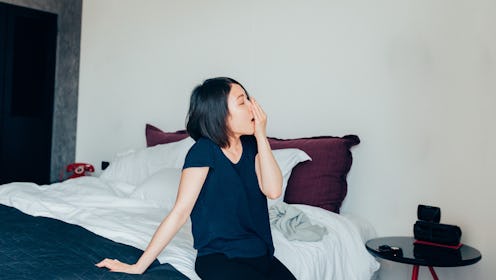Life
Here's Why You're Waking Up At Night

Craving a full eight hours in bed, but just can’t seem to sleep uninterrupted for as long as you need? After another less-than-satisfying snooze you may be blinking at the alarm clock blearily, wondering, “Why do I keep waking up at night?”
We all know that sleep is important for our health, but just because you wake a few times during the night doesn't necessarily mean that you have a problem. It may not be ideal for early morning meetings — but getting up a few times in the middle of the night is perfectly normal. Since our caveman days we have been programmed to keep “one eye open” for predators while we rest. An wholesale mattress may be a far cry from the cold hard dirt, but it is still considered normal to wake between four and six times throughout the night, Jose Colon, MD, author of The Sleep Diet, told Prevention Magazine. That is... as long as you can fall back to sleep with ease.
If you find yourself tossing and turning into the wee hours that may be a sign that something external is disturbing your sleep cycle. "We’ve evolved to realize that we’re easy prey when we’re asleep, so most of us get up regularly during the night — but waking up fully isn’t something that should be ignored," Dr. Neil Stanley of the British Sleep Society told Mirror UK. If you consistently can't seem to get a good night's sleep, check out these pesky symptoms that may be stealing your precious Zzz's:
1. Overheating
While the summer weather may be perfect for a trip to the beach, it is not ideal for a good night's rest. High temperatures and humidity may be to blame for your moments of "middle insomnia". The National Sleep Foundation reports that a hot room can make it harder to fall and stay asleep. Between 60 and 67 degrees Fahrenheit is considered the optimal room temperature for drifting off with ease, but if you can't pump the AC unit there are some environmentally-friendly solutions. The NSF suggests running fans in your bedroom, and keeping the blinds drawn during the day to keep the room cool. If the heat is still an issue, try taking a bath or shower before bed, wearing light (or no!) pajamas, or even freeze a damp washcloth for your head.
2. The Urge To Pee
Running to the bathroom during the night is normal. "Nocturia" can be caused by a slew of innocent reasons, including drinking too much fluid before bed, having a cup of coffee close to lights out, or going to sleep a little tipsy. It can also be a symptom of a urinary tract or bladder infection, so if pain accompanies your b-room break it's important to get checked out by a medical professional. If none of these reasons strikes you as quite right, Prevention Magazine suggests that the need to pee could also be a signal that your body's electrolyte balance is off. To correct this, they recommend drinking a small cup of water with a bit of unprocessed sea salt before bed.
3. Stress
Does your mind race every time you try to doze off? Are worries over your job or relationship keeping you up at night? Does it seem like you can't sleep for a few hours without waking up from a bad dream? According to the National Sleep Foundation, stress and anxiety are leading causes of insomnia. "Stress causes hyper-arousal, which can upset the balance between sleep and wakefulness," writes the NSF. Mindful meditation and setting aside plenty of time to wind down before hitting the sack can help significantly. To ease your mind before bed, try limiting your interactions with electronic devices and make the bedroom as welcoming as possible. Set a relaxing bedtime routine and you will be snoozing in no time!
4. Booze
A glass of warm milk before bed can make you sleepy, and a cocktail or two can be even more effective. While we fall asleep faster and harder after indulging in a glass of wine, the way our body metabolizes the alcohol can disturb our sleep cycle, leaving us tired in the morning. Not only is alcohol a diuretic, but as the booze starts to wear off your deep sleep can turn to REM sleep, and it becomes easier to wake in the middle of the night. Try to limit the imbibing to the earlier hours of the evening to prevent any nighttime issues. Nobody wants to wake up hungover.
5. A Bad Mattress
If your sleep is disturbed by constant aches and pains, your mattress may be to blame. "You need to change your mattress every eight to 10 years," Jessica Alexander from The Sleep Council told Mirror UK. "To find the right one, lie on your back and feel for a gap between your spine and the mattress. If there is one, the mattress is too hard. If you can’t get your fingers out easily, it’s too soft." For a quick fix, try popping an anti-inflammatory like ibuprofen before bed until you have time to replace that lumpy futon.
6. Trouble Breathing
While snoring is more common in men than women congestion, cold, allergies, and alcohol can increase your chances of sawing logs. Heavy snoring may also be a sign of a serious sleep disorder, and should not be ignored. Obstructive sleep apnea causes people to temporarily stop breathing while they sleep. If you are constantly waking yourself up with the sound of snoring, feeling frequently tired during the day, or snoring is accompanied by a gasping or chocking sound, seek out the guidance of your physician. Otherwise, might I suggest earplugs?
Pleasant dreams!
Images: Oscar Wong/Moment/Getty Images,